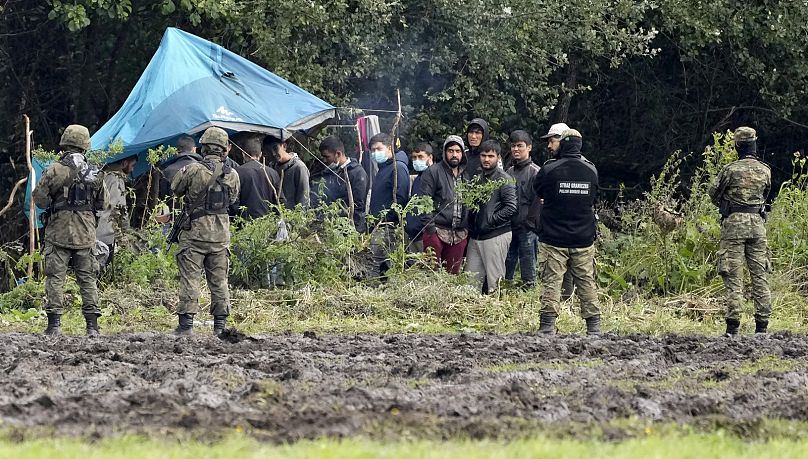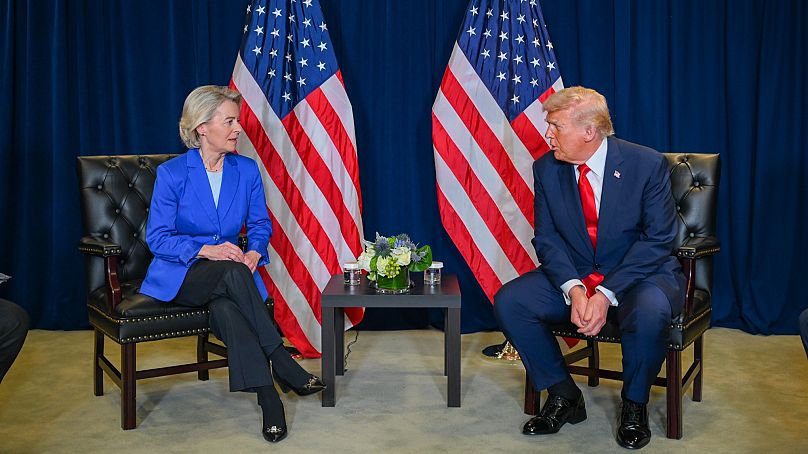Does the EU have what it takes to survive in the age of weaponisation? Recent events have cast light on the crucial question.
When Ursula von der Leyen delivered her annual State of the European Union speech earlier this month, she set the tone from the minute she took the stage.
"Europe must fight for its place in a world in which many major powers are either ambivalent or openly hostile to Europe," she told lawmakers in Strasbourg.
"A world of imperial ambitions and imperial wars. A world in which dependencies are ruthlessly weaponised. And it is for all of these reasons that a new Europe must emerge."
A week later, Mario Draghi, the former prime minister of Italy and author of a landmark report on competitiveness, issued a similarly bleak warning.
"The past year has shown clearly that we are operating in a different world. The line between economy and security is increasingly blurred. States are using every tool at their disposal to advance their interests," he said in the presence of von der Leyen.
"We must build the capacity to defend ourselves and withstand pressure at key chokepoints – defence, heavy industry, and the technologies that will shape the future."
Both speeches, delivered in stark terms to avoid any misunderstanding, captured the crippling sense of encirclement that has spread across Europe as it navigates what experts and analysts have already coined the new age of weaponisation.
Over the last decade, countries of various sizes and economic prowess have set aside their scruples to exploit their national assets to advance their national interests at the expense of adversaries, competitors and, as of late, long-time allies.
Trade flows, customs duties, supply chains, natural resources, currency reserves and even human beings are today being leveraged at an unprecedented scale, wreaking havoc on norms and principles that were meant to stabilise international relations.
The assertive practice heralds a return to the era of hard-boiled statism, but with the modern addition of a highly interconnected and interdependent globe, where one tiny move on the chessboard can bring down all the other pieces.
As one senior EU diplomat recently put it: "We no longer live in a rules-based order, but in a power-based order."
When everything is up for grabs
Weaponisation is a relatively new word in the European vernacular.
One of its first dramatic examples dates back to August 2018, when Donald Trump, in his first term as United States president, withdrew from the Iran nuclear deal and reimposed the punishing sanctions that had been lifted as part of the negotiations.
Trump, though, took it further and threatened to punish companies that maintained commercial ties with Tehran, regardless of their location or ownership. "Anyone doing business with Iran will NOT be doing business with the United States," he said.
Brussels sharply criticised the decision and invoked one obscure law, the Blocking Statute, to nullify disproportionate US decisions and protect European firms. However, the mere thought of losing access to the mighty American market and, crucially, the mighty American dollar proved to be more than convincing. Total, France's largest energy company, quickly abandoned a €4.1 billion gas project in Iran.
In a retrospective analysis, the London School of Economics (LSE) found that Trump's threat of secondary sanctions amounted to the weaponisation of monetary policy.
"In addition to weaponisation, it also represents an aggressive form of extraterritoriality which has perhaps not been seen on this scale in the past, and was thought to have broadly disappeared in the post-war order," the analysis said.
Brussels contended with the phenomenon again, but under a completely unexpected dimension, in the summer of 2021. The border between Belarus and Poland, as well as Lithuania, was suddenly overwhelmed by a mass influx of asylum seekers coming from faraway countries, such as Iraq, Afghanistan, Syria and Congo.
The finger was firmly pointed at Belarusian President Alexander Lukashenko, who had previously threatened to "flood" the EU with migrants and drugs if the bloc imposed sanctions over the forced diversion of a Ryanair flight that carried two Belarusian opposition activists. Evidence then emerged of an intricate network of travel agencies, cheap flights and online campaigns to fly people into the capital, Minsk.
"This is a hybrid attack. Not a migration crisis," von der Leyen said.
Weaponisation, and its capacity to unleash economic chaos, was laid bare a year later, when Russia cut off gas flows to Europe and triggered a record-breaking spike in prices. Energy, a commodity considered reliable and stable, was now too up for grabs.
Since then, cases of weaponisation have only multiplied.
Just this year, the EU faced back-to-back shocks. First, when Trump enacted his contentious "reciprocal" tariffs that unilaterally upended global commerce. Second, when China retaliated against these duties by curbing exports of seven rare earth elements that are crucial for the automotive, energy, technology and defence sectors.
Although different in nature, both episodes shared the intention to leverage one powerful asset – America's market and China's deposits, respectively – as a means to bring to heel sovereign nations. The US secured lopsided deals, while Beijing secured a truce.
Both episodes shared another trait: the EU did not respond to either.
Against Beijing's curbs, Brussels first voiced outrage and then opted for dialogue. Against Trump's tariffs, it considered deploying for the first time its Anti-Coercion Instrument, which allows broad retaliation in goods, services, foreign direct investment, financial markets, public procurement, intellectual property and export controls.
But sharp disagreements between member states, split into hawks and doves, tied the European Commission's hands and left the instrument, precisely designed to combat cases of economic weaponisation, stashed in the drawer.
"Europe should have learned one thing: leverage is not a default feature for a big market. It needs to be actively built and used," said Tobias Gehrke, a senior policy fellow at the European Council on Foreign Relations (ECFR).
"Hoping China and the US will not take economic hostages again is no strategy. If Europe wants deterrence, it needs to do its homework now and build the coalition to actually pull the trigger when the day comes."
'The Brussels Defect'
The glaring lack of reaction has raised uncomfortable yet pertinent questions about the bloc's ability to survive in an era where nation-states unapologetically manipulate their hard power applying cutthroat realpolitik.
"Europe does not yet see itself as a power," French President Emmanuel Macron said after the EU struck a trade deal with the US that imposed a 15% tariff on its goods.
"To be free, you must be feared. We were not feared enough."
But the EU was not created to instil fear.
The bloc emerged from the ashes of World War II as a small group of countries that pooled their steel and coal production. It gradually evolved into a single market committed to democracy, human rights and the pursuit of peace. Although its powers grew over time, as seen in the recent push on defence, its structure retained the focus on compromise that often translates into painstaking negotiations and complex laws.
As global turmoil deepened and geopolitics took over economics, the cracks in the consensus machine started to show. The time-honoured rule to achieve unanimity in foreign affairs, in particular, came under intense scrutiny.
What was once known as the Brussels Effect has now become the "Brussels Defect", says Henry Farrell, professor of international affairs at Johns Hopkins University and co-author of the book How America Weaponized the World Economy.
"Power politics never went away nearly as fully as people believed, and now they are back. And once the old assumptions begin to unravel, they are likely to hasten a self-reinforcing process of change," Farrell told Euronews.
"Political entities like the EU, which were deeply bought into multilateral interdependence, are deeply vulnerable to these tactics."
By contrast, the US, China, Russia and other nations are unbounded by cumbersome internal procedures and can tighten chokepoints, be it currency, minerals or fossil fuels, at the stroke of a pen, without waiting for anyone's approval. In other words, they can merge market power and national security into one course of action. Their growing contempt for international rules has only emboldened their disposition.
In the EU, this merger is hindered by the internal division of competences: market power lies with the Commission, and national security lies with member states.
"The EU has options in principle. Its markets and rules could provide it with powerful chokeholds that it can use or threaten to use to protect itself," Farrell said. "But to do this, the EU needs to commit wholeheartedly. It just isn't credible for the EU to talk about the Anti-Coercion Instrument unless it is willing to deploy it against other powers."
Recent events, like Russia's invasion of Ukraine and Trump's return to the White House, have prompted a debate on how to reform the bloc to boost its global prowess.
Mario Draghi, for example, has pitched large-scale joint borrowing, consolidation in strategic sectors, a "Made in Europe" preference, and state aid for cutting-edge technology. He has, more ambitiously, floated a model of European federation.
Meanwhile, von der Leyen said: "It is time to break free from the shackles of unanimity."
All these solutions are designed to grant greater authority to the institutions in Brussels and ensure the 27 member states can move beyond their disparate interests and operate on the global stage more rapidly, decisively and strategically. For Draghi and von der Leyen, centralisation is an essential requirement to hit back at weaponisation.
Ironically, the solutions they have put forward are, to a greater or lesser extent, resisted by the capitals, which, after all, remain the ultimate holders of power.
"Of course, this path will break long-standing taboos. But the rest of the world has already broken theirs," Draghi said in his speech. "For Europe's survival, we must do what has not been done before and refuse to be held back by self-imposed limits."













